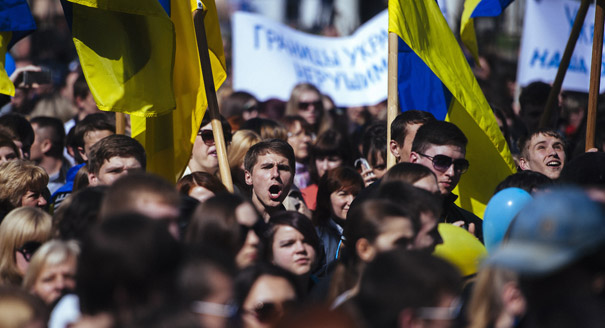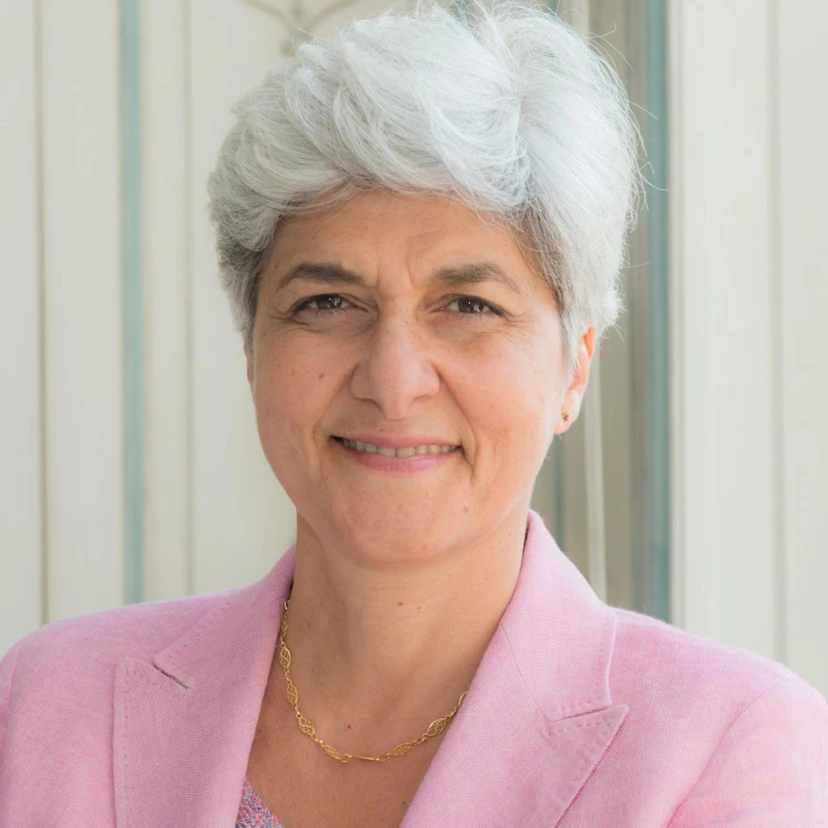The fear that Europe might ‘fall behind’ rival economic powers has long shaped European integration. In the present phase of global disorder, this fear has intensified.
Scott Lavery

Source: Getty
The EU made a mistake when it compromised with Russia and delayed the implementation of its free trade agreement with Ukraine.
The EU suddenly and surprisingly changed its long and firmly held position that Russia has no right to interfere in its relations with Ukraine on September 12. EU Trade Commissioner Karel De Gucht announced that an agreement had been reached between the EU, Russia, and Ukraine to delay the implementation of a deep and comprehensive free trade agreement (DCFTA) between the EU and Ukraine.
By postponing the DCFTA, the economic core of the Association Agreement meant to bring Ukraine closer to the union, some EU leaders apparently wanted to accommodate the Kremlin. The concession on the DCFTA was meant to give Moscow an additional incentive to stick to a ceasefire that Russia, Russian-supported rebels, and the Ukrainian government had agreed to on September 5. The so-called Minsk protocol also set in motion a broader process to end the fighting between pro-Moscow and pro-EU forces in Ukraine.
But delaying the DCFTA is a mistake. It gives Russia incentives to raise the pressure because it opens a large window of opportunity to prevent the DCFTA from entering into force. The pressure could be military, economic, or diplomatic. And the delay puts at risk what should be the EU’s longer-term response to the Ukraine crisis: a redoubled effort to help the country build itself up as a successful liberal democracy and market economy.The original plan had been for the DCFTA to enter into force in November 2014, but the new agreement delays implementation until December 31, 2015.
Under the new plan, Ukraine can continue to export goods to the EU without custom duties until the DCFTA is implemented. The duties were removed in March 2014 to help shore up Ukraine’s economy. In return for delaying the DCFTA’s implementation, Russia agreed not to cancel the free trade agreement with Ukraine.
In his press conference, De Gucht said that the postponement would give either party time “to make remarks, proposals.” Some have argued that from an economic standpoint, the deal is relatively positive for Ukraine because it relieves the pressure to adapt to EU norms immediately—a process that is at the core of the DCFTA—and keeps free trade with Russia intact.
But both Ukraine and the EU have long been aware of the risk of Russian retaliation. And it has always been clear that implementing the association and free trade agreements would come with considerable costs.
Even so, the benefits of a transformation of the Ukrainian economy through the means of adapting EU rules and standards were seen as by far outweighing the costs. In a speech in October 2010 in Kiev, De Gucht said:
[The] EU is offering access to the largest and wealthiest market in the world with 500 million consumers. The internal market within the EU has created one of the most prosperous and stable economies in the world. Can you imagine the possibilities for your exporters to access a consumer market at least thirty times as big on favourable terms?
The most innovative characteristic of this particular future trade agreement is the approximation with trade-relevant EU rules and regulations. This is unique and unprecedented.
Ukrainian manufacturers will thus be able to meet EU norms and standards simply by respecting its own rules and regulations. Coupled with the abolition of import duties already mentioned, the barriers and costs of accessing the EU, the largest market in the world, could be swept aside.
Postponing the DCFTA means that the transformation of the Ukrainian economy is likely to be postponed as well. The pressure and the incentives for difficult reforms are much weaker without the DCFTA.
And Moscow has already clarified that what it wants to prevent is precisely the start of a reform process in Ukraine that would lead to an adaptation to EU norms and standards. Russian Minister of Economic Development Alexey Ulyukaev wrote in a letter to De Gucht on September 15 that “the launch of the full or partial implementation” of the provisions of the Association Agreement by Ukraine before the end of December 2015 would be interpreted as “the actual entry of the Agreement into force” and that such a move would prompt Russia to take retaliatory measures. And in a letter to Ukrainian President Petro Poroshenko, Russian President Vladimir Putin has warned that “changing national legislation to prepare for the EU-Ukraine trade deal . . . would trigger an immediate response from Moscow.”
It is not a changed economic calculation that led to the delay of the DCFTA, but a changed geopolitical context.
For years, Russia had objected to Ukraine’s deepening ties to the EU. It tried to lure Ukraine into the Moscow-led Customs Union, which will be transformed into the Eurasian Economic Union.
Meanwhile, Ukraine and the EU have long insisted that Russia is not a party to the Association Agreement and has no right to veto it. In the run-up to the EU’s Eastern Partnership summit in November 2013, German Chancellor Angela Merkel said in the German parliament: “Those [Eastern Partnership] countries decide alone about their future alignment. A veto right by third parties cannot exist” (author’s translation).
At the same time, the EU has repeatedly offered Moscow opportunities to talk about Russian concerns over the DCFTA, especially the allegation that Russia would be negatively affected by free trade between the EU and Ukraine. But the Russian side has appeared to be uninterested in talking.
At the last EU-Russia summit in January 2014, both sides finally agreed to set up a group to discuss Russian concerns. European Council President Herman Van Rompuy said, “There can be different interpretations and misunderstandings on the association agreements and that is why we both agreed to pursue bilateral consultations at experts level . . . and the economic consequences on both sides.” On July 11, a trilateral meeting between the EU, Russia, and Ukraine took place in Brussels.
But these efforts were never meant to reopen negotiations about the Association Agreement and the DCFTA. Those negotiations had been concluded in 2011.
Instead, the EU wanted to address the widespread criticism that it had ignored Russian concerns. The view in Brussels was that Moscow’s objections were largely misunderstandings and misinterpretations based on geopolitics, not economics. Michael Emerson, a former EU ambassador to Russia, concluded that Russian objections were “basically a non-story.”
The statement from September 12 underscored that the decision to postpone the DCFTA was driven by political, not economic considerations. It said that the agreement was “part and parcel of a comprehensive peace process in Ukraine,” referring to the Minsk protocol.
The drive for compromise seems to have come from the West. Reportedly, Merkel, French President François Hollande, and U.S. President Barack Obama had put pressure on Poroshenko and EU Commission President José Manuel Barroso to find a compromise with Russia over the DCFTA. According to another account, “several EU countries” had said they would block the ratification of the Association Agreement in their parliaments if no compromise were found with Russia.
The compromise that has been found is the postponement of the DCFTA. This appeared to be the least-damaging solution. By deferring the agreement, the parties would not touch the substance of it, which is important to both the EU and Ukraine. In return, Russia would not take any immediate retaliatory measures. And the peace process in Ukraine would possibly be strengthened by accommodating the Russian side.
While the DCFTA has been postponed, the Ukrainian parliament and the European Parliament ratified the Association Agreement. Temporary implementation of the accord will begin on November 1, with full implementation only after all 28 EU member states have agreed.
But without the DCFTA, the Association Agreement is unlikely to be very efficient. The EU side will have much less incentive to engage, particularly the European Commission, which is responsible for the DCFTA. On the other side, Ukraine will have much less incentive to start a painful reform process. “The frame will be operative but without the content,” as one commentator said.
The reaction in Ukraine was negative. Ukraine’s Deputy Foreign Minister Danylo Lubkivsky resigned, saying that the delay “sends the wrong signal to everyone, to the aggressor, to our allies, and most importantly, to Ukrainian citizens.” As a press report summed up, “many in Kiev . . . see the last-minute backtrack as a political concession to safeguard the cease-fire by giving Russia a veto over a Ukrainian issue.” “I am speechless. The last time this happened, we had EuroMaidan,” said the deputy governor of the region of Dnipropetrovsk in Ukraine, referring to the pro-EU popular movement that took down a former Ukrainian president, Viktor Yanukovych, in early 2014.
There was criticism in the EU as well, especially from the European Parliament. Elmar Brok, head of the European Parliament’s foreign affairs committee, said that “nobody knows whether this will make Putin change his mind, or whether he will continue with his imperial politics” (author’s translation). Jacek Saryusz-Wolski, a member of the same committee, commented: “Putting the EU-Ukraine trade deal on ice is the wrong decision. It would delay the necessary reforms and set a bad precedent.”
The EU’s decision to postpone the DCFTA seems to be high risk for several reasons.
First, compromising on the DCFTA sends a very problematic signal to Ukraine. As one Ukrainian commentator said, this means that “Ukraine will spend next year without key reforms,” and the delay encourages the authorities “to put a brake on reform.”
But reform of the Ukrainian state and economy, not geopolitics, is the EU’s main goal in Ukraine: the union seeks to help the country become a self-sustaining and successful liberal democracy and market economy. It was this goal that triggered the Euromaidan protests. The DCFTA is the centerpiece of reform. Delaying looks as if the EU is no longer fully committed to reform in Ukraine.
Second, the EU’s tactics send a problematic signal to Russia by implicitly rewarding military action and providing an incentive to further undermine EU-Ukraine relations.
For years, the EU was clear that the Association Agreement and the DCFTA were strictly bilateral issues; Russia would have no veto power and no seat at the negotiating table. In postponing the DCFTA for a considerable time, the EU has admitted that by using military force in Ukraine, Russia’s actions have significantly influenced EU-Ukraine relations.
And Russia clearly feels emboldened by the postponement. It has already started to make new demands: Moscow said the trilateral group of Russia, Ukraine, and the EU should work on “amendments in the Association Agreement of Ukraine with the EU allowing for legally binding formulas to remove the concerns of the Russian side.” In other words, Russia demands to reopen the negotiations and to become a party to them.
Moscow now has more than a year to increase pressure on Ukraine and the EU to dissuade them from concluding the DCFTA in its current form. As one analysis states, “Moscow’s ultimate goal is to block the process of Ukraine’s association with the EU, and as a result, to cause political changes in Ukraine which will lead to its membership of the Customs Union.”
The DCFTA is the core of the EU’s project to strengthen Ukraine by integrating it into the EU’s huge common market. Sticking to this project remains the most important part of the West’s response to the Ukraine crisis.
It is not an accident that Russia is targeting the DCFTA. From the Kremlin’s perspective, undermining the agreement is a way to undermine Ukraine’s efforts to build closer ties to the EU. Only if the DCFTA does not enter into force does Russia have a chance to regain control of Ukraine—its ultimate goal.
What the EU should do now to limit the damage is to make clear to Russia that although it is postponed, the DCFTA’s substance will not be changed. Regarding Ukraine, the EU should increase its efforts to stabilize the country within the framework of the Association Agreement and beyond. Germany’s decision to send only up to twenty civilian experts and police officers to the EU Advisory Mission for Civilian Security Sector Reform Ukraine is a worrying sign that the commitment is not very robust.
Carnegie does not take institutional positions on public policy issues; the views represented herein are those of the author(s) and do not necessarily reflect the views of Carnegie, its staff, or its trustees.
The fear that Europe might ‘fall behind’ rival economic powers has long shaped European integration. In the present phase of global disorder, this fear has intensified.
Scott Lavery
Despite considerable challenges, the CPTPP countries and the EU recognize the need for collective action.

Barbara Weisel
France has stopped clinging to notions of being a great power and is embracing the middle power moment. But Emmanuel Macron has his work cut out if he is to secure his country’s global standing before his term in office ends.

Rym Momtaz
How significant are statements by senior U.S. officials about supporting democracy abroad in the context of a foreign policy led by a president focused on near-term transactional interests?


Thomas Carothers, McKenzie Carrier
Despite offering security benefits to candidates and the EU alike, the enlargement agenda appears stalled. Why is progress not being made, and is it time for Europe to rethink its approach?


Sylvie Goulard, Gerald Knaus